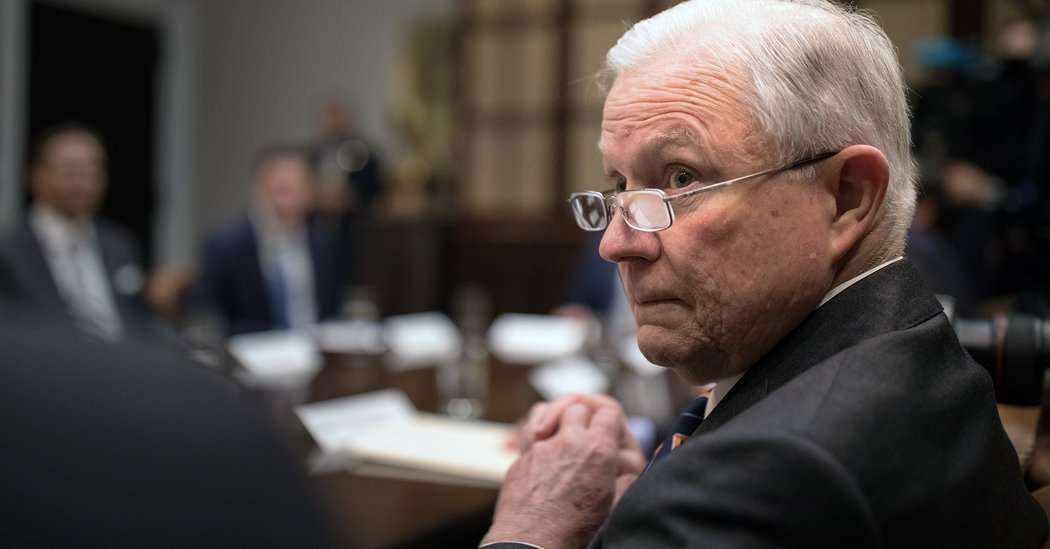The attorney general announced in March that he had recused himself from all matters related to the 2016 election, including the Russia inquiry. The disclosure came after it was revealed that Mr. Sessions had not told Congress that he met twice with the Russian ambassador to the United States at the time, Sergey I. Kislyak, during the campaign.
Mr. Sessions, an early supporter of Mr. Trump’s presidential run, had been among a small group of senior campaign and administration officials whom Mr. Mueller had been expected to interview.
Mr. Mueller’s interest in Mr. Sessions shows how the president’s own actions helped prompt a broader inquiry. What began as a Justice Department counterintelligence investigation into Russia’s election interference is now also an examination of whether Mr. Trump tried to obstruct the inquiry, and the nation’s top law enforcement officer is a witness in the case.
For Mr. Mueller, Mr. Sessions is a key witness to two of the major issues he is investigating: the campaign’s possible ties to the Russians and whether the president tried to obstruct the Russia investigation.
Mr. Mueller can question Mr. Sessions about his role as the head of the campaign’s foreign policy team. Mr. Sessions was involved in developing Mr. Trump’s position toward Russia and met with Russian officials, including the ambassador.
Along with Mr. Trump, Mr. Sessions led a March 2016 meeting at the Trump International Hotel in Washington, where one of the campaign’s foreign policy advisers, George Papadopoulos, pitched the idea of a personal meeting between Mr. Trump and Mr. Putin. Mr. Papadopoulos pleaded guilty in October to lying to federal authorities about the nature of his contacts with the Russians and agreed to cooperate with the special counsel’s office.
As attorney general, Mr. Sessions was deeply involved in the firing of the former F.B.I. director, James B. Comey, and the president has repeatedly criticized Mr. Sessions publicly and privately for recusing himself from the Russia investigation.
Advertisement Continue reading the main story
When Mr. Trump learned in March that Mr. Sessions was considering whether to recuse himself, the president had the White House’s top lawyer, Donald F. McGahn II, lobby Mr. Sessions to remain in charge of the Russia investigation.
Newsletter Sign Up Continue reading the main story Breaking News Emails Get the latest on the special counsel investigation — and other major news — delivered to your email inbox. Please verify you're not a robot by clicking the box. Invalid email address. Please re-enter. You must select a newsletter to subscribe to. Sign Up You agree to receive occasional updates and special offers for The New York Times's products and services. Thank you for subscribing. An error has occurred. Please try again later. View all New York Times newsletters.
Mr. Sessions instead followed the guidance of career prosecutors at the Justice Department, who advised him that he should not be involved with the investigation. When Mr. Trump was told of this, the president erupted in anger, saying he needed an attorney general to protect him.
After Mr. Mueller was appointed in May, Mr. Trump again erupted at Mr. Sessions and Mr. Sessions offered to resign. Several days later, Mr. Trump rejected Mr. Sessions’s offer.
Mr. Trump insisted to reporters in the Oval Office on Tuesday afternoon that he was not troubled that Mr. Sessions had spoken to Mr. Mueller’s investigators.
“No, not at all,” Mr. Trump said.
The president was also asked whether Christopher A. Wray, the director of the F.B.I. who replaced Mr. Comey, had threatened to resign because Mr. Trump and Mr. Sessions were pressuring him to clear the bureau of loyalists to Mr. Comey, as reported by the website Axios late on Monday.
“He didn’t at all,” Mr. Trump said of Mr. Wray. Asked again, the president added: “He did not even a little bit. Nope. He’s going to do a good job.”
Mr. Wray’s tenure has been fraught as the president has repeatedly fanned suspicion about whether the F.B.I.’s work is politically motivated. But he stopped short of threatening to quit, a person familiar with the events said. Mr. Wray told Mr. Sessions that he needed to move at his own pace to make changes within the F.B.I., and that if the president and the attorney general wanted replacements made more quickly, someone else would have to do it, the person said.
Two weeks ago, Mr. Mueller subpoenaed Mr. Trump’s former chief strategist, Stephen K. Bannon, to testify before a grand jury. Mr. Mueller is expected to forgo the grand jury appearance for now and will instead have his investigators interview Mr. Bannon in the coming weeks.

3Suze on January 23rd, 2018 at 16:40 UTC »
I've put this on a couple of posts because I think it's illuminating.
Seth Abramson does a really good analysis of what this means
Unrolled thread
Edit; I have updated the link because I jumped the gun while Abramson was adding more content
BirtSampson on January 23rd, 2018 at 15:22 UTC »
Sessions has a lot of memory problems
EHEC on January 23rd, 2018 at 14:48 UTC »
First cabinet member.